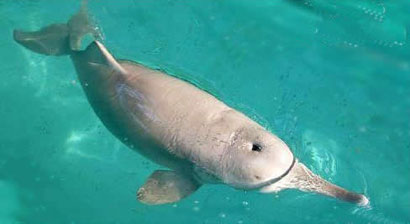Yangtze dolphin on verge of extinction
(Xinhua)Updated: 2006-12-03 09:52
 A white-fin dolphin. [file]  |
A team of 30 Chinese and foreign scientists have failed in a 26-day search to find the rare white-fin dolphin in the Yangtze River.
The white-fin dolphin is more endangered than the giant panda due to the pollution and environmental degradation, said Wang Ding, vice director of the hydrobiology institute of the Chinese Academy of Sciences.
The last expedition in 1997 located 13 white-fin dolphins, the world's rarest dolphin, which lives only in China's longest river, the Yangtze.
"We can't say the white-fin dolphin is extinct," said Wang. "However, the population has dropped dramatically over the past decade."
Wang and his colleagues estimate that no more than 50 are left.
If the white-fin dolphin disappears on earth, it will be the first whale species extinct due to human activities. More than 90 percent of deaths of the white-fin dolphins were caused by human activities, scientific data showed.
During the 1,700-kilometer expedition from Yichang to Shanghai, the scientists found the population of black finless porpoises had also fallen.
In addition to deck observers equipped with high-performance telescope to spot dolphins, the team members used hydrophone machines to detect acoustic signals from the dolphins.
They have obtained some sound records during the expedition which needs more analysis. It's the last hope of the scientists, Wang said.
A patrolman of the fishery administration was reported to see the rare dolphin for the last time in April this year. But he didn't take a photo of the dolphin, and scientists were not sure it was a real white-fin dolphin. Since then there were no such reports.
Wang said pollution, overfishing, shipping and a large number of water conservancy projects had affected the habitats of the animals.
Illegal fishing by means of electric shock, poisons and explosives will accidentally injure and kill the dolphins, said scientists.
The white-fin dolphins have bad eyesight and use their own sonar system for orientation. The noises of ships will disturb the sonar system of the dolphins which are easy to get killed in the screws of the ships.
The dolphins also require a clean water living environment. Scientists have got water samples of the Yangtze River, which will be sent to a lab in Switzerland to analysis the pollutants.
"If the situation cannot be improved, the white-fin dolphin may be extinct within ten years, and the black finless porpoise will also be endangered," Wang said.
There are an estimated 1,000 black finless porpoises in the river, dropping by half from 12 years ago, according to Wang.
After a short rest in Shanghai, the scientists will return to Huhan from Shanghai and will continue their search for the rare species in the Yangtze River.
If any white-fin dolphin is discovered, it will be taken to natural reserve for protection, according to the scientists.
A conservation base for white-fin dolphin has been set up in a lake in central China's Hubei Province. However, no white-fin dolphin pairs have been caught in the lake in the past ten years, increasing the difficulty of artificial propagation.
Some scientist say the only way to save the species is to improve the environment of the Yangtze River.
Conservation work on the Yangtze freshwater dolphins started from 1986. The Chinese government has established six natural reserves to protect them along the middle and lower reaches of the Yangtze River.
|
||
|
||
|
|